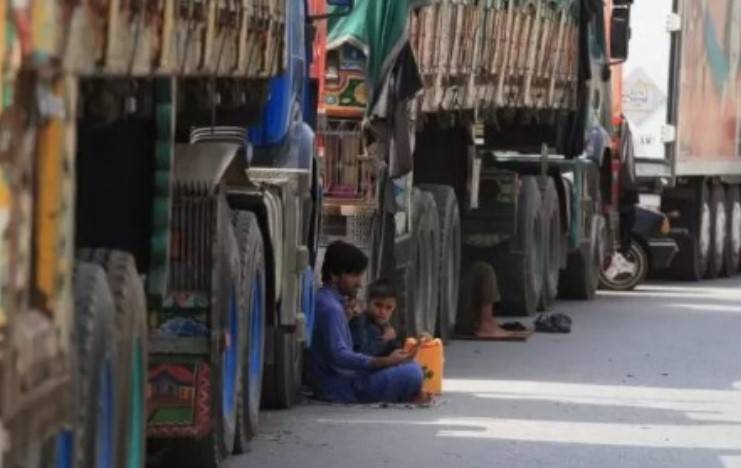Parachinar standstill persists as roads remain closed
Grand Jirga resolves tribal dispute in Kurram but protesters defiant in peace process; Food and medicine shortages gripping region due to roadblocks

Stay tuned with 24 News HD Android App

A peace accord reached between warring tribes in Kurram has failed to end the protest in Parachinar, where residents continue to face road blockades, leading to severe shortages of food and medicines.
According to the 24NewsHD TV channel report, despite subzero temperatures, protesters are staging a sit-in, demanding resolution of their grievances before opening the roads.
The Grand Jirga, formed to mediate the dispute, finalised a peace agreement two days ago (on Wednesday, January 1) after both sides signed a seven-page document comprising 14 key points.
The accord includes the demolition of bunkers, surrender of heavy weapons to the authorities, and strict adherence to previous agreements, including the 2008 Murree Agreement.
Barrister Saif, spokesperson for Khyber Pakhtunkhwa's provincial government, confirmed the signing of the agreement. He stated that both sides agreed to follow the directives of the provincial APEX Committee.
The agreement also mandates cooperation between village elders, peace committees, and law enforcement agencies for long-term stability.
However, local activist Mir Afzal Khan has declared that protests will continue until roads are fully reopened, asserting that the people's demands must be addressed before any further action.
Meanwhile, the ongoing road closures have created a humanitarian crisis in the region, with essential supplies running low. Citizens are calling on authorities to urgently restore normalcy.
The seven-page peace agreement has 14 points to which both parties agreed, along with the Grand Jirga members. The document stated that members of the Kurram Peace Committee and both sides would be bound to uphold the Muree Agreement 2008 and all other agreements for the benefit of locals and the establishment of peace.
The agreement allowed the authorities to take strict action against those trespassing on roads while the village and peace committee would also cooperate with the government and law enforcement agencies.
In case of any untoward incident on the main road, the area people would be bound to prove their innocence in line with the Kurram district traditions.
It said those harbouring and feeding miscreants would be considered guilty under the law and traditions. The decisions of the KP Apex Committee would be followed to ensure the security of the road. Regarding the repatriation of displaced persons under the Murree Agreement, the jirga agreed that they would be rehabilitated in their native areas and no hurdles would be created in this process. To this effect, a sub-committee would be formed under the chairmanship of the Kurram deputy commissioner, assisted by the district police officer and two members each from the Upper and Lower Kurram sides. This committee would be responsible for addressing the hurdles and reservations regarding the repatriation of displaced persons.
In addition to this, the longstanding land disputes in Gedu, Pewar Alizai, Balishkhel, Dandar, Ghoz Ghari, Nisti Kot, Kunj Alizai, Shorko, Sadda, and Bagan Alizai would be resolved in the light of revenue records, local traditions, and the land commission terms of reference.
The land commission would immediately start working in the designated areas, and the peace committee, district administration, and law enforcement agencies would lend support to it. Similarly, in those areas where Section 144 was already imposed, both parties would be made to implement previous orders as well as previously resolved disputes. The jirga also agreed to ban the display of weapons and collecting donations for purchasing arms.
Both parties would provide a course of action to authorities within a fortnight regarding bans on arms in line with the provincial cabinet’s decision.
It also said that both sides would not use arms and weapons against each other after signing the agreement, and in case of violation, the government with the assistance of the peace committee would take action against the culprits. Besides, law enforcement agencies would also confiscate the arms from the area locals, and a fine of Rs10 million would be imposed on the village and area in question. To ensure peace in the district, no person or tribe would be allowed to turn their personal disputes into sectarian ones. In addition to this, there would be a ban on outlawed sectarian outfits opening offices and working in the area, and action would be taken in case of violation.
In addition to this, no hurdles and restrictions would be allowed on roads. Both sides also agreed to ensure protection of those seeking shelters and to prevent the dishonour of women and desecration of bodies. All those employed by the state and private entities, including teachers, judicial staff, and others, would be allowed to work in any part of the district without any fear. Local elders would be bound to provide security to these employees in line with the Pashtun tradition of hospitality. Those fomenting hate on social media would be dealt with strictly and would be regarded as enemies of both sides.
In case of any untoward incident in any area, the peace committees would immediately get into action, and the other aggrieved party would not react to the incident. Besides, village peace committees would help law enforcement agencies in bringing the situation under control.
Reporter: Mohsin Sherazi
